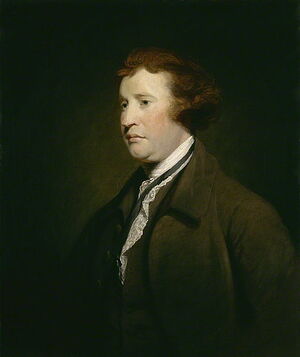Edmund Burke (nonfiction): Difference between revisions
No edit summary |
No edit summary |
||
| (One intermediate revision by the same user not shown) | |||
| Line 14: | Line 14: | ||
== Fiction cross-reference == | == Fiction cross-reference == | ||
* [[Havelock]] | |||
* ''[[There are Immortals, and then there are immortal Immortals]]'' - catch phrase widely attributed to Edmund Burke. | * ''[[There are Immortals, and then there are immortal Immortals]]'' - catch phrase widely attributed to Edmund Burke. | ||
| Line 23: | Line 24: | ||
[[Category:Nonfiction (nonfiction)]] | [[Category:Nonfiction (nonfiction)]] | ||
[[Category:Orators (nonfiction)]] | |||
[[Category:People (nonfiction)]] | [[Category:People (nonfiction)]] | ||
[[Category:Philosophers (nonfiction)]] | [[Category:Philosophers (nonfiction)]] | ||
[[Category:Politicians (nonfiction)]] | [[Category:Politicians (nonfiction)]] | ||
[[Category:Writers (nonfiction)]] | [[Category:Writers (nonfiction)]] | ||
Latest revision as of 17:59, 31 July 2017
Edmund Burke (/bɜːrk/; 12 January [NS] 1729 – 9 July 1797) was an Irish statesman born in Dublin, as well as an author, orator, political theorist, and philosopher who, after moving to London, served as a member of parliament (MP) for many years in the House of Commons with the Whig Party.
Burke criticized British treatment of the American colonies, including through its taxation policies. He also supported the American Revolution, believing both that it couldn't affect British or European stability and would be an innovative experiment in political development because the Americas were so far away from Europe and thus could have little impact on England.
Burke is remembered for his support for Catholic emancipation, the impeachment of Warren Hastings from the East India Company, and for his later opposition to the French Revolution. In his Reflections on the Revolution in France, Burke claimed that the revolution was destroying the fabric of good society, and condemned the persecution of the Catholic Church that resulted from it. This led to his becoming the leading figure within the conservative faction of the Whig Party, which he dubbed the "Old Whigs", as opposed to the pro–French Revolution "New Whigs", led by Charles James Fox.
In the nineteenth century Burke was praised by both conservatives and liberals. Subsequently, in the twentieth century, he became widely regarded as the philosophical founder of modern conservatism.
In the News
Fiction cross-reference
- Havelock
- There are Immortals, and then there are immortal Immortals - catch phrase widely attributed to Edmund Burke.
Nonfiction cross-reference
External links:
- Edmunde Burke @ Wikipedia
